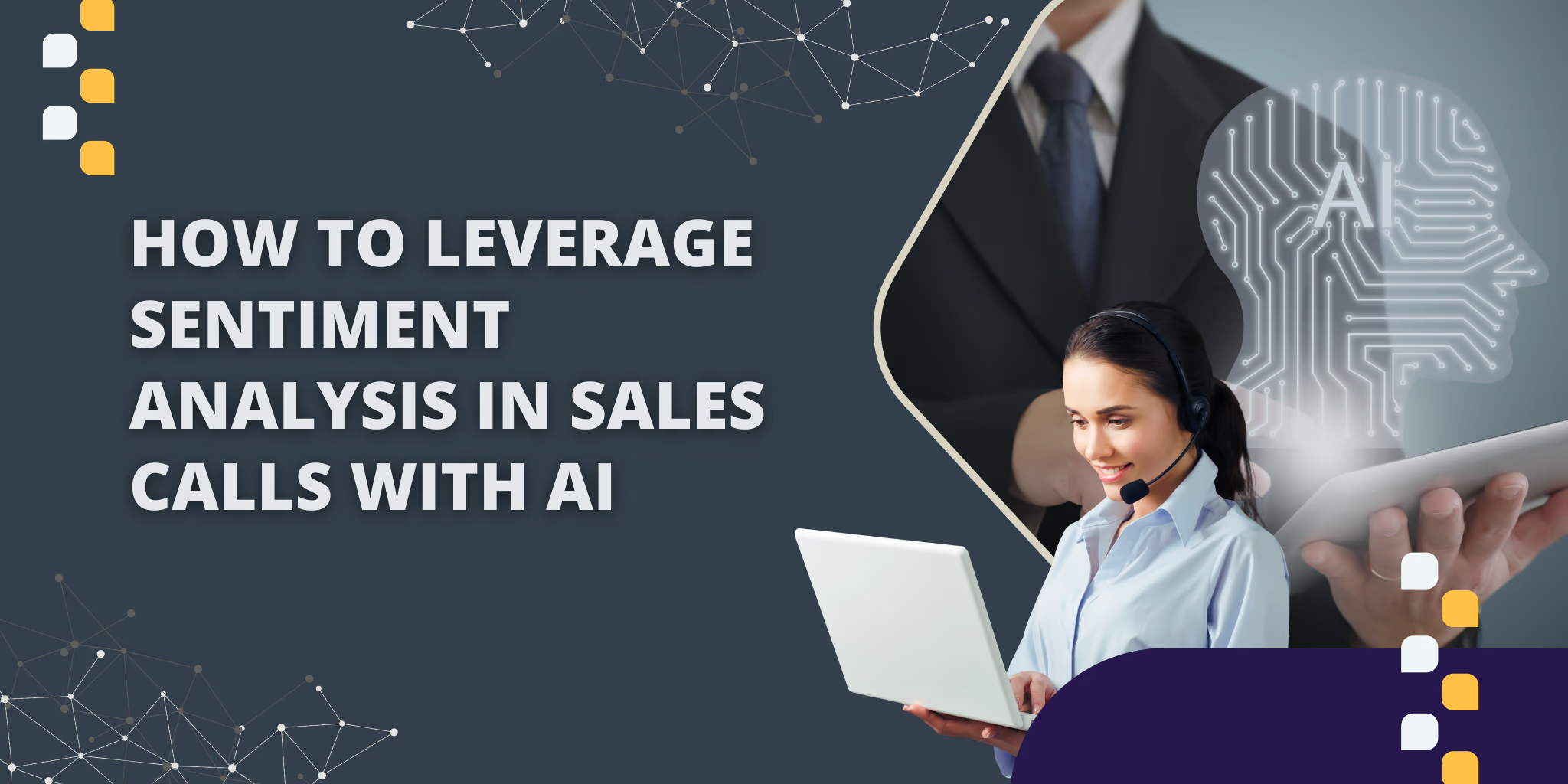TL;DR
For revenue-ops leaders exploring AI call-sentiment analysis, the technology transcribes both words and vocal tone in real time, scores emotion, and pushes insights into the CRM—flagging churn risks, coaching moments, and upsell cues within seconds. In 2025, dual-channel engines that fuse text with acoustics beat text-only models by ~40 % accuracy, making them the fastest, most reliable path to predictable revenue gains.The Conversation is the New Data Goldmine
Every sales call is more than a conversation—it’s a treasure trove of data. For decades, coaching has relied on anecdotal evidence, call shadowing, and subjective “gut feelings.” This is no longer sufficient in a market where brand loyalty is fragile and customer expectations are relentlessly rising.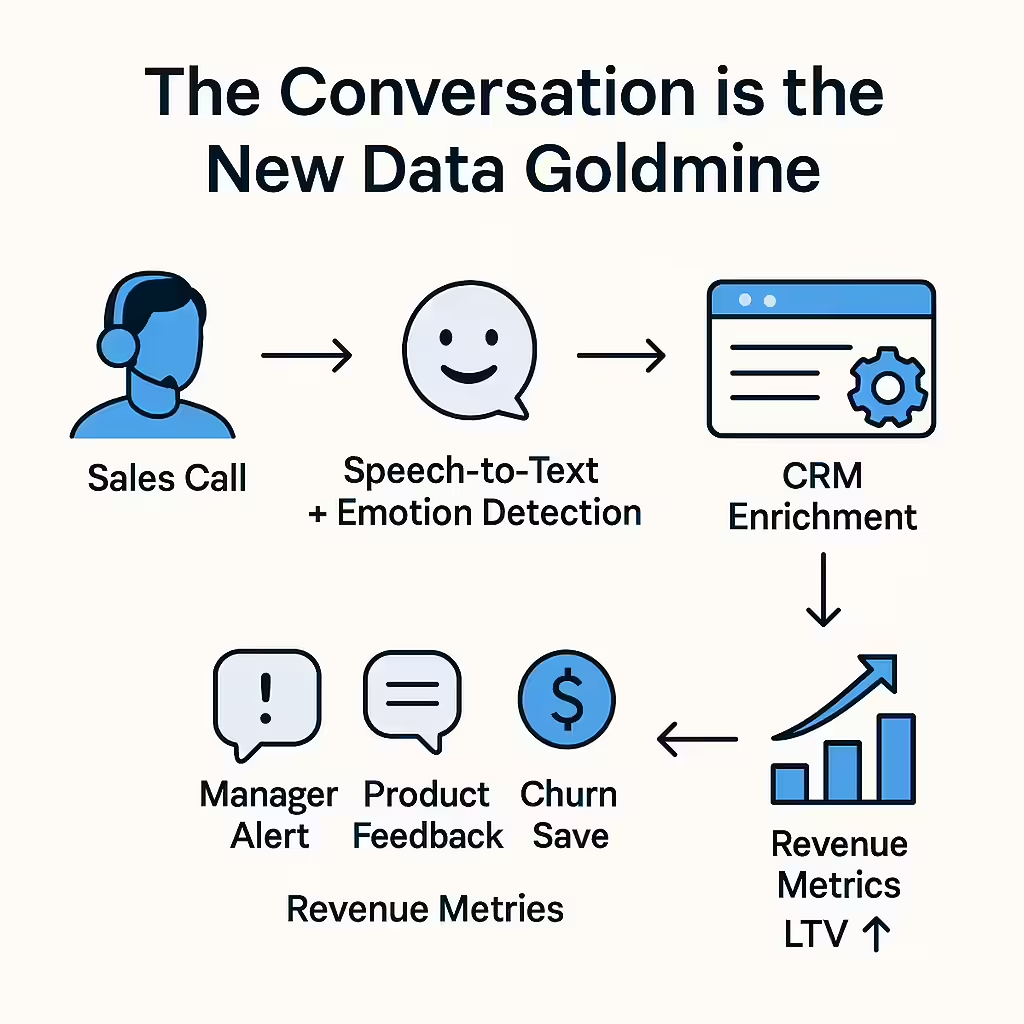 In fact, the gap between the experience companies think they deliver and what customers feel is widening. This erosion of customer experience puts an estimated $4 trillion in annual revenue at risk, making a scientific, data-driven approach an urgent strategic imperative.
This is where AI-powered call sentiment analysis becomes the critical technology for bridging the gap. It moves beyond simple listening to enable a profound understanding, quantification, and strategic response to the emotional undercurrents of every customer interaction. By decoding not just what is said but how it is said, organizations can unlock unprecedented insights that drive measurable business outcomes.
In fact, the gap between the experience companies think they deliver and what customers feel is widening. This erosion of customer experience puts an estimated $4 trillion in annual revenue at risk, making a scientific, data-driven approach an urgent strategic imperative.
This is where AI-powered call sentiment analysis becomes the critical technology for bridging the gap. It moves beyond simple listening to enable a profound understanding, quantification, and strategic response to the emotional undercurrents of every customer interaction. By decoding not just what is said but how it is said, organizations can unlock unprecedented insights that drive measurable business outcomes.
What is AI Call Sentiment Analysis?
At its core, AI sentiment analysis converts the qualitative “gut feel” of a call into a quantified score. Using Natural Language Processing (NLP) and machine learning, it identifies and categorizes the emotional tone within a conversation, typically as positive, negative, or neutral.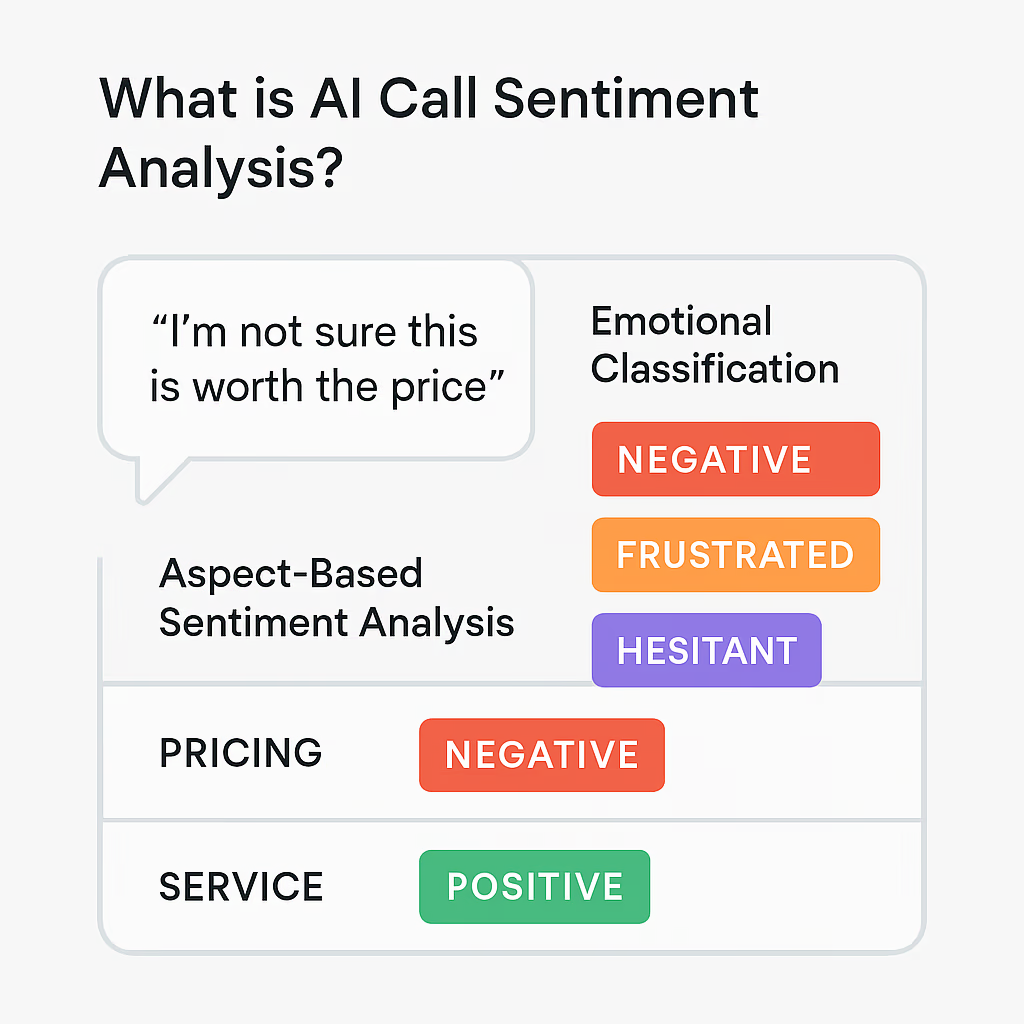 However, modern platforms go far beyond simple classification to provide a level of detail that is strategically valuable:
However, modern platforms go far beyond simple classification to provide a level of detail that is strategically valuable:
- Fine-Grained Analysis: This moves beyond a simple “positive/negative” to a more detailed scale (e.g., a five-point system or a numerical score), allowing you to measure the intensity of customer emotion.
- Emotion Detection: More advanced systems identify specific emotions like joy, anger, sadness, or frustration, providing a rich layer of insight for targeted coaching.
- Aspect-Based Sentiment Analysis (ABSA): This is one of the most powerful applications. ABSA pinpoints sentiment toward specific topics. A customer might express positive sentiment about your “customer service” while conveying negative sentiment about its “pricing,” allowing for highly targeted operational improvements.
Takeaway: Quantified emotion is now a board-level KPI, not a nice-to-have.
To analyze a call, advanced AI processes two distinct data streams simultaneously: the words spoken and the way they are spoken. The most accurate systems, like Kixie’s, then fuse these modalities together to form a holistic and robust interpretation.
Text Analysis: Decoding the Words
This analyzes the linguistic content of the call. The process starts with a highly accurate Speech-to-Text transcription. Then, a pipeline of NLP techniques like tokenization, lemmatization, and vectorization converts the text into a numerical format that deep-learning models (like Transformers) can understand, capturing complex context, negation, and even sarcasm.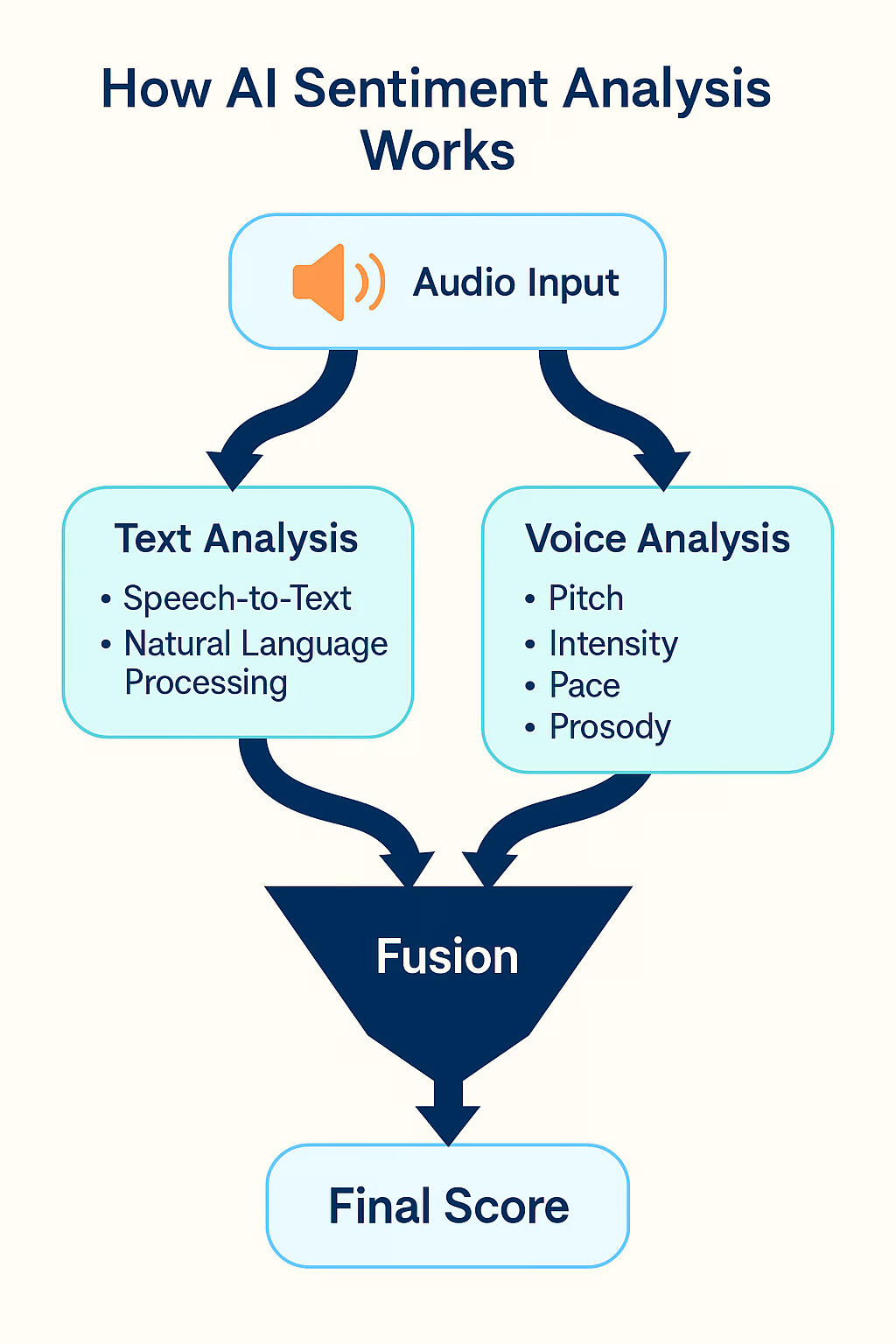
How AI Call Sentiment Analysis Works: The Multimodal Engine
Voice Analysis: Decoding the Tone
Text alone misses a huge part of human communication. This is where voice analysis, or Speech Emotion Recognition (SER), comes in. It analyzes non-linguistic “vocal biomarkers” directly from the audio signal to spot stress, excitement, or hesitation by extracting:- Pitch: The highness or lowness of the voice.
- Intensity (Volume): The loudness of speech.
- Pace: The speed of talking.
- Prosody: The rhythm, stress, and intonation patterns of speech.
Fusion: Resolving Ambiguity
This is where the magic happens. Multimodal fusion combines both text and voice analysis to achieve unparalleled accuracy. It resolves ambiguity by considering both what was said and how it was said. For instance, the phrase “That’s great” spoken with a flat, frustrated tone would be flagged as negative, not positive.Takeaway: Dual-channel analysis = fewer false positives and coaching insights you can trust.
The Strategic Imperative: Translating Call Sentiment Analysis into Tangible ROI
Understanding the technology is foundational, but its true value is realized when insights are translated into measurable business outcomes. By quantifying signals of emotion and empathy—vocal tone, talk-to-listen ratios, patience—it transforms empathy into a measurable, scalable, and optimizable driver of core financial metrics.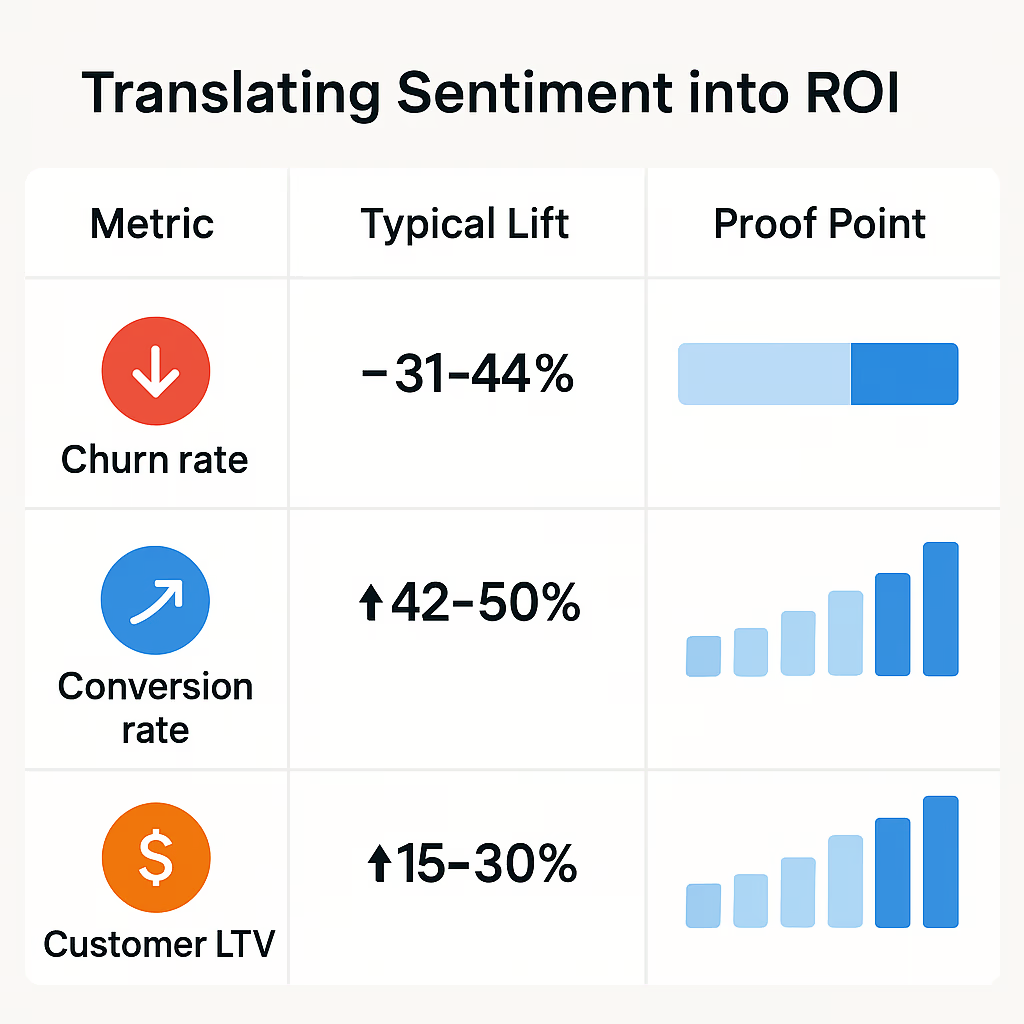 This is the monetization of empathy. Emotion metrics aren’t vanity—they map directly to revenue levers.
This is the monetization of empathy. Emotion metrics aren’t vanity—they map directly to revenue levers.
| Metric | Typical Lift* | Proof Point |
|---|---|---|
| Churn rate | ↓ 31–44 % | Real-time negative-sentiment alerts enable proactive saves and issue resolution. |
| Conversion rate | ↑ 42–50 % | Reps can pivot messaging when pricing or feature sentiment turns sour, addressing objections in real time. |
| Customer LTV | ↑ 15–306 % | Customers who feel an emotional connection to a brand demonstrate far greater loyalty and long-term spend. |
Actionable Use Cases Across the Revenue Team
When Conversation Intelligence data is integrated deeply into a central CRM, it breaks down information silos and becomes a core component of a unified Revenue Intelligence strategy.- For Sales Leaders: Transform coaching from a subjective art to a data-driven science. Pinpoint “coachable moments,” identify the winning behaviors of top reps to build a data-backed playbook, and use sentiment trends for more accurate “emotional forecasting.”
- For Sales Reps: Gain a real-time co-pilot. Receive live alerts on negative sentiment spikes, allowing you to pivot strategy mid-call. Use AI summaries and sentiment scores for self-coaching and continuous improvement.
- For Marketing Teams: Get an unfiltered line to the Voice of the Customer (VoC). Validate campaign messaging, gather real-world competitor intelligence, and mine frequent customer pain points for highly relevant content ideas.
- For Customer Success & Product Teams: Create a powerful, closed-loop feedback system. Proactively reach out to at-risk accounts showing declining sentiment, and use aspect-based analysis to feed quantitative product feedback directly into the development roadmap.
Deploying AI Call Sentiment Analysis: A 6-Step Framework
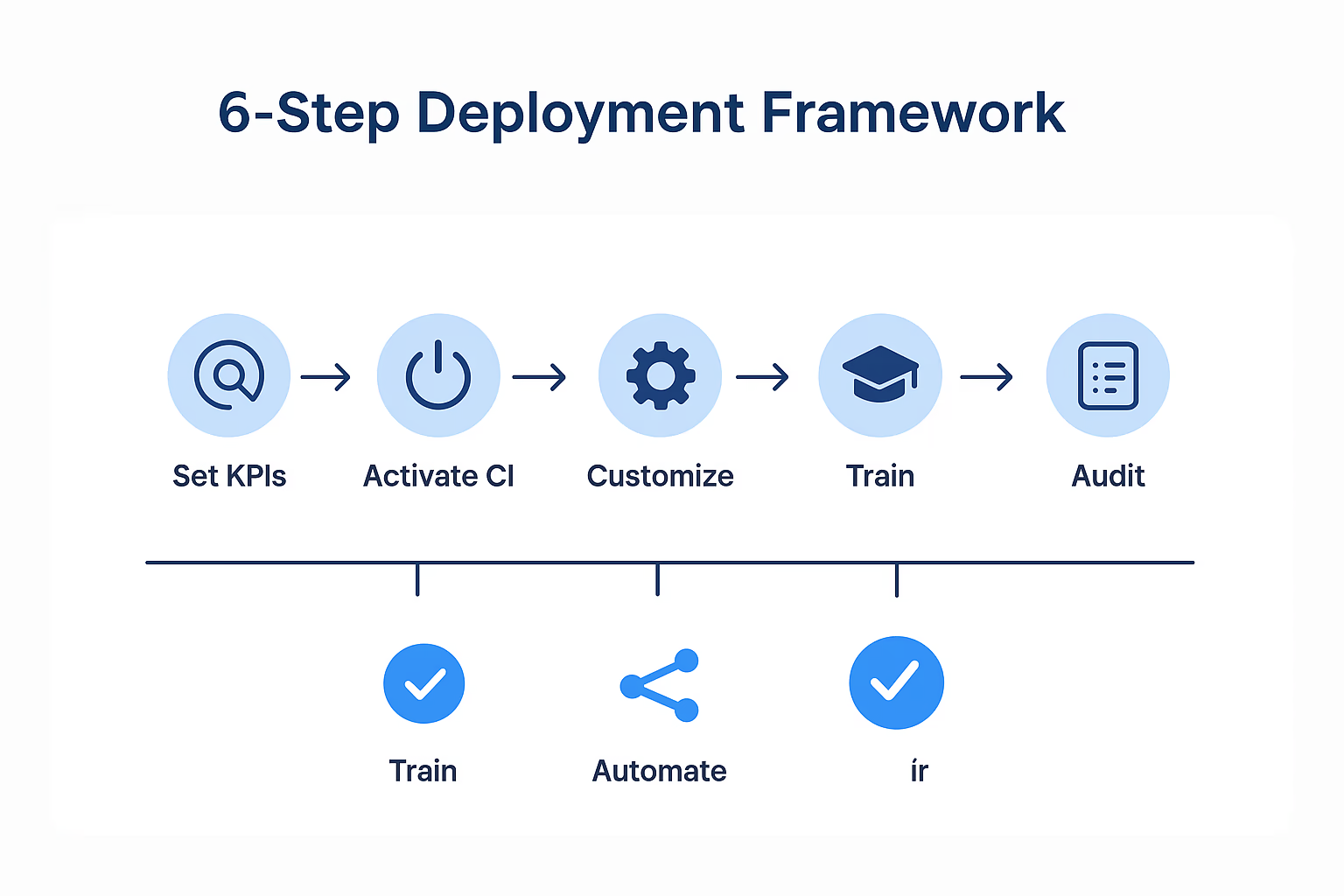 A successful deployment goes beyond technical setup. It requires a strategic, phased approach that aligns technology with business goals.
A successful deployment goes beyond technical setup. It requires a strategic, phased approach that aligns technology with business goals.
- Set Goals & KPIs: Define success first. For example, “cut customer churn 15% in 6 months” or “increase demo conversion rate by 10%.”
- Activate Conversation Intelligence: Within your Kixie dashboard, enable CI for chosen agents to start the analysis.
- Customize the Model: Configure Kixie’s call-strength weights, and define the custom keywords (competitor names, pricing terms) and phrases (key value propositions) that matter most to your business.
- Train Your Teams: Use AI-flagged “coachable moments” for role-playing and 1:1 sessions. Focus on how to act on the insights, not just on the tool’s features.
- Embed Alerts & CRM Automations: Use Kixie’s deep, bi-directional sync to trigger workflows. For example, automatically create a task in your CRM for a manager to review any call with a sentiment score below 40.
- Audit and Iterate Quarterly: Language and market dynamics evolve. Schedule regular reviews to update your keywords, fine-tune the model, and ensure the insights remain sharp.
Treat the rollout like any revenue program—own the metrics, iterate fast.
Addressing the Nuances: Ethics, Compliance, and Challenges
The power to analyze human emotion comes with significant responsibility. No AI is perfect, and acknowledging its limitations is crucial for building trust.- The Nuance Problem: AI can still struggle with complex sarcasm, irony, and cultural context. Multimodal analysis (fusing text and tone) helps significantly, but a human-in-the-loop process to review ambiguous calls is a best practice.
- The Ethics of Engagement: The goal is to provide helpful, proactive support—not to engage in emotional manipulation. Organizations must establish a clear “Ethical AI Usage Policy” that defines the boundaries for their teams.
- Privacy & Compliance: Adherence to GDPR/CCPA is non-negotiable. This requires transparency (disclosing that calls are recorded and analyzed), consent where required, and robust data security. Choose a platform like Kixie that keeps customer conversation data out of shared global training sets and provides a clear Ethical AI Usage Policy.
Trust hinges on transparency—choose platforms that prove it.
Frequently Asked Questions
- Q: Does Kixie flag sarcasm accurately?
- A: Yes. It fuses text with vocal tone, so a sarcastic phrase like “that’s great” delivered in a frustrated voice is correctly scored as negative.
- Q: How fast are sentiment scores available after a call?
- A: Within seconds. Scores, keywords, and AI summaries post to your CRM record automatically, enabling immediate follow-up actions.
- Q: Can I tailor the sentiment model for industry jargon?
- A: Absolutely. Admins can add and weight custom keywords and phrases to retrain the model for your specific domain language in minutes.
- Q: How does real-time alerting work on live calls?
- A: Negative-sentiment spikes can trigger on-screen or Slack-based prompts, so reps can pivot their messaging and save the conversation before it derails.
- Q: What’s the pricing versus Gong or Chorus?
- A: Kixie bundles the power dialer, business SMS, and sentiment analytics into a single platform at a lower total cost of ownership than standalone Conversation Intelligence tools. No extra licenses or bolted-on tools are needed.
- Q: Does Kixie work with my CRM?
- A: Yes. Kixie provides deep bi-directional sync with HubSpot, Salesforce, and other major CRMs to log sentiment and call scores natively in your deal records and trigger CRM automations. No swivel-chairing is required.


